外研版八年级上册Module 1 How to learn English Unit 3 language in use课件(共35张PPT)
文档属性
| 名称 | 外研版八年级上册Module 1 How to learn English Unit 3 language in use课件(共35张PPT) |
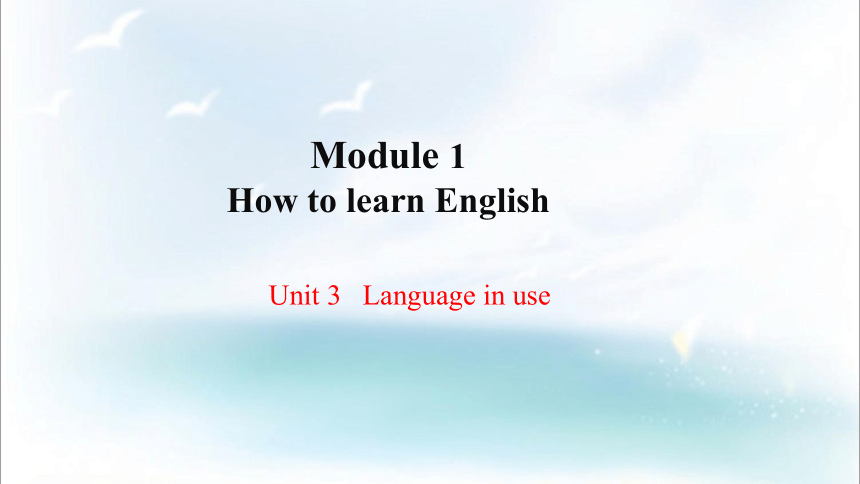
|
|
| 格式 | pptx | ||
| 文件大小 | 19.6MB | ||
| 资源类型 | 教案 | ||
| 版本资源 | 外研版 | ||
| 科目 | 英语 | ||
| 更新时间 | 2024-09-25 15:53:53 | ||
图片预览

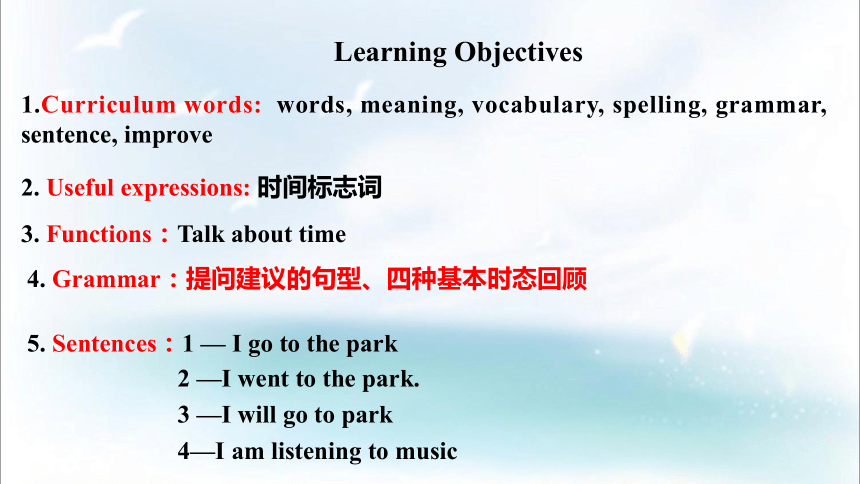
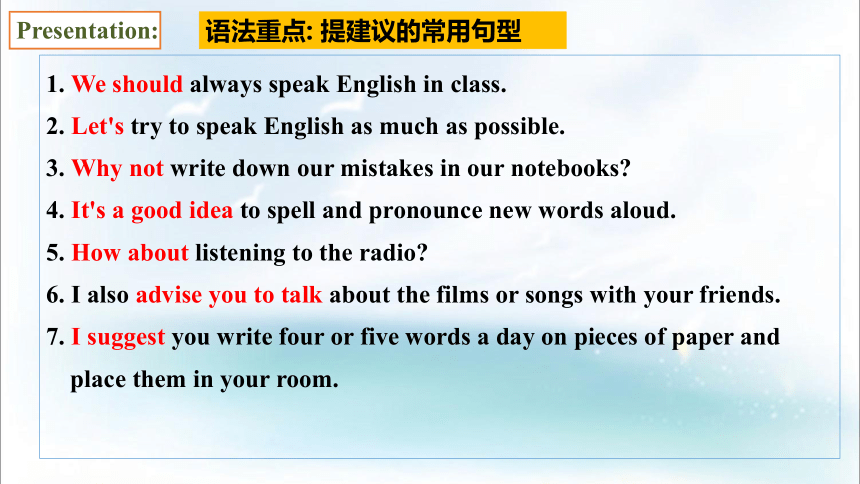
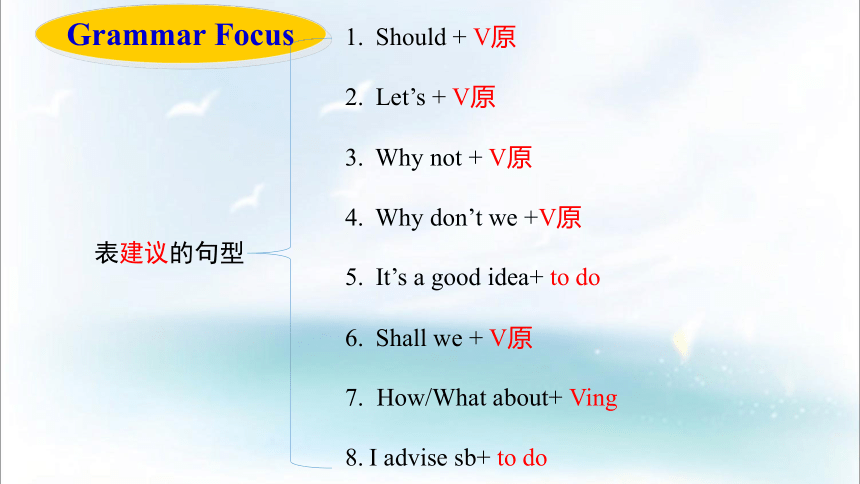
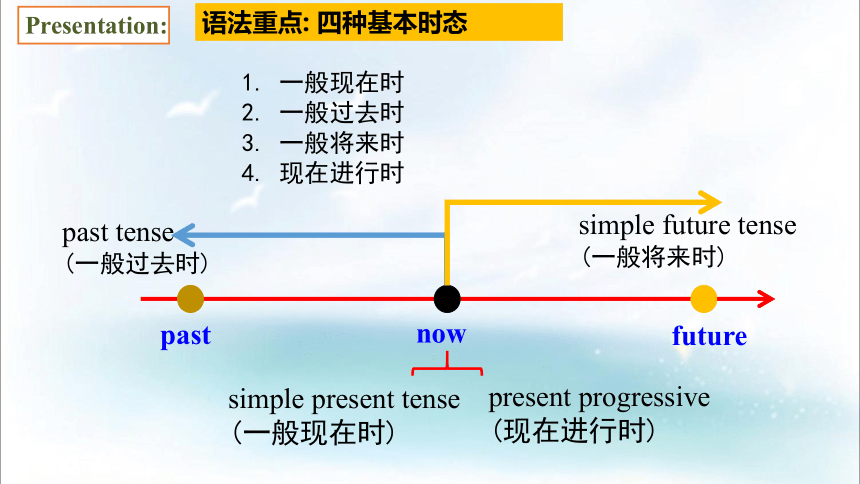
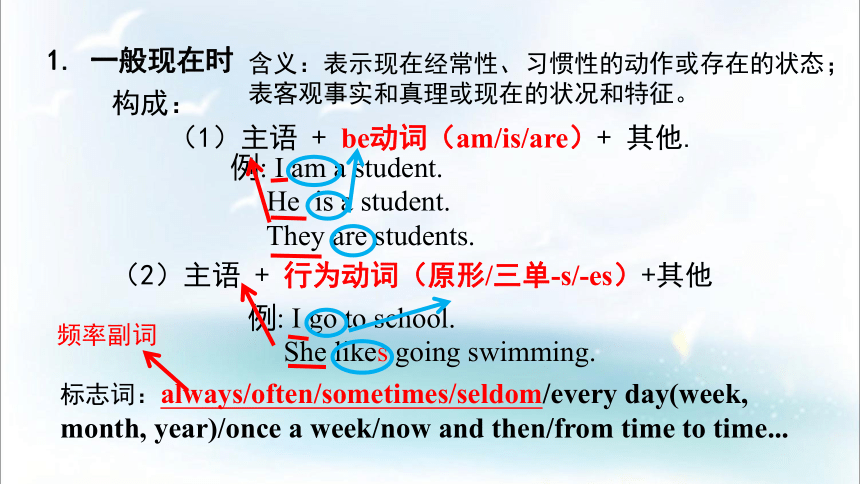
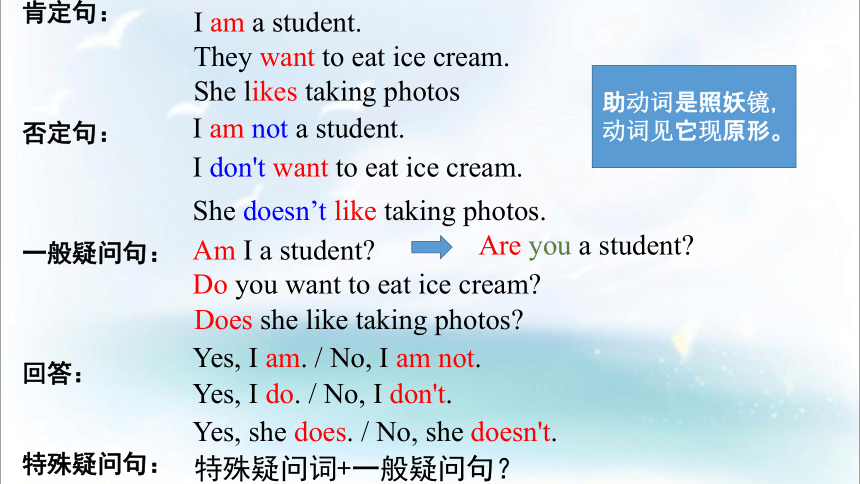
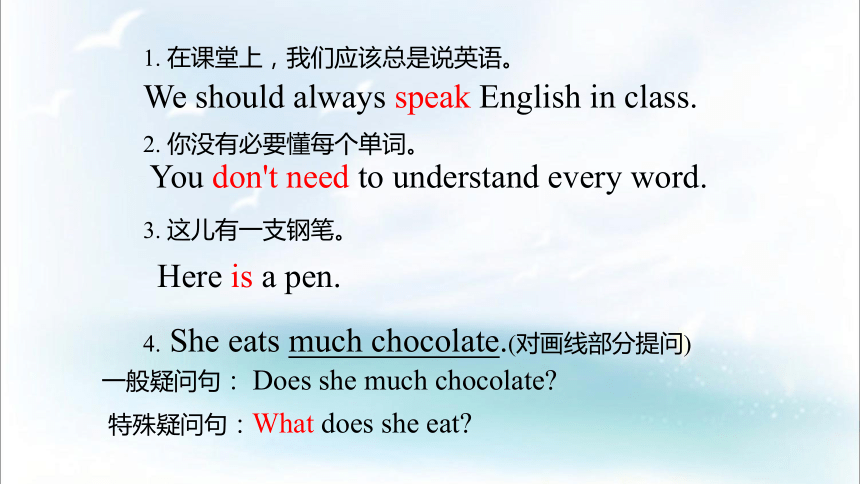
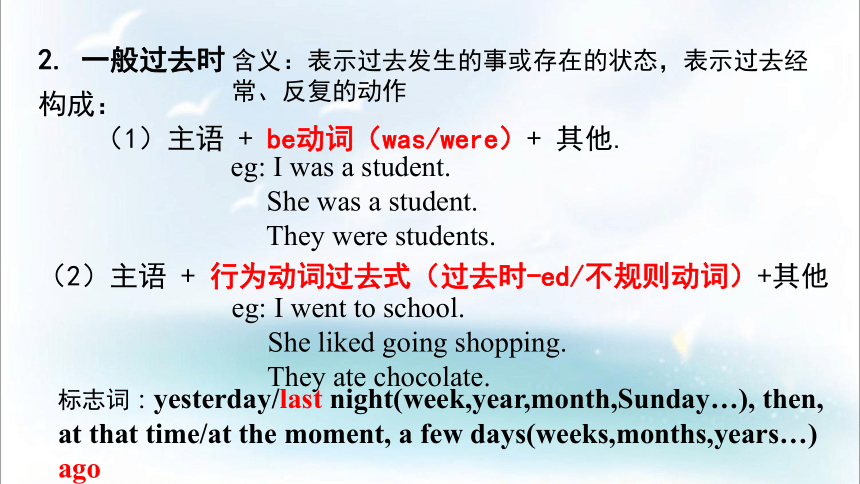
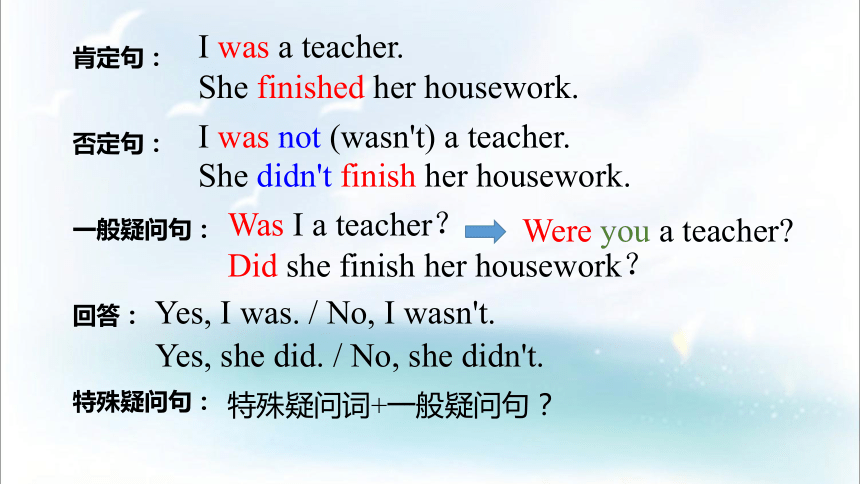
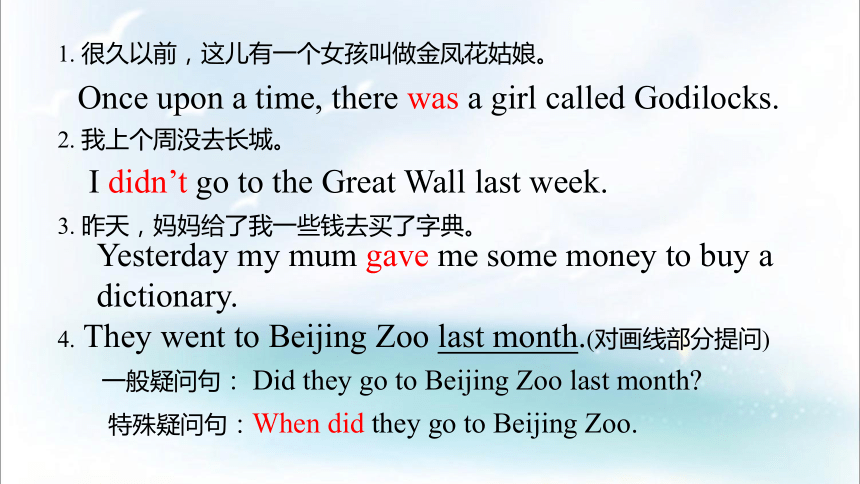
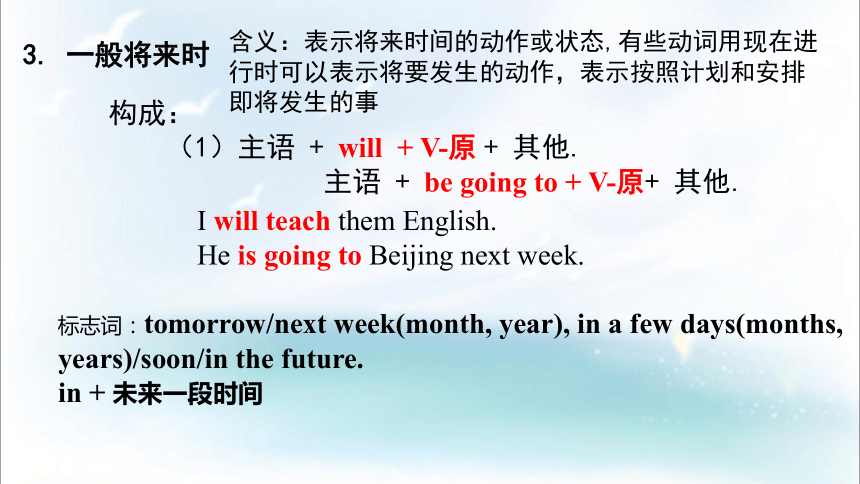
文档简介
(共35张PPT)
Module 1
How to learn English
Unit 3 Language in use
1.Curriculum words: words, meaning, vocabulary, spelling, grammar, sentence, improve
5. Sentences:1 — I go to the park
2 —I went to the park.
3 —I will go to park
4—I am listening to music
2. Useful expressions: 时间标志词
3. Functions:Talk about time
4. Grammar:提问建议的句型、四种基本时态回顾
Learning Objectives
1. We should always speak English in class.
2. Let's try to speak English as much as possible.
3. Why not write down our mistakes in our notebooks
4. It's a good idea to spell and pronounce new words aloud.
5. How about listening to the radio
6. I also advise you to talk about the films or songs with your friends.
7. I suggest you write four or five words a day on pieces of paper and place them in your room.
Presentation:
语法重点: 提建议的常用句型
Grammar Focus
表建议的句型
Should + V原
Let’s + V原
Why not + V原
Why don’t we +V原
It’s a good idea+ to do
Shall we + V原
7. How/What about+ Ving
I advise sb+ to do
1. 一般现在时
2. 一般过去时
3. 一般将来时
4. 现在进行时
now
simple present tense
(一般现在时)
present progressive
(现在进行时)
past
past tense
(一般过去时)
simple future tense
(一般将来时)
future
Presentation:
语法重点: 四种基本时态
1. 一般现在时
构成:
(1)主语 + be动词(am/is/are)+ 其他.
(2)主语 + 行为动词(原形/三单-s/-es)+其他
含义:表示现在经常性、习惯性的动作或存在的状态;表客观事实和真理或现在的状况和特征。
例: I am a student.
He is a student.
They are students.
例: I go to school.
She likes going swimming.
标志词:always/often/sometimes/seldom/every day(week, month, year)/once a week/now and then/from time to time...
频率副词
肯定句:
否定句:
一般疑问句:
回答:
特殊疑问句:
I am a student.
They want to eat ice cream.
She likes taking photos
I am not a student.
I don't want to eat ice cream.
Am I a student
Are you a student
Do you want to eat ice cream
Yes, I am. / No, I am not.
Yes, I do. / No, I don't.
特殊疑问词+一般疑问句?
助动词是照妖镜,
动词见它现原形。
She doesn’t like taking photos.
Does she like taking photos
Yes, she does. / No, she doesn't.
1. 在课堂上,我们应该总是说英语。
2. 你没有必要懂每个单词。
3. 这儿有一支钢笔。
4. She eats much chocolate.(对画线部分提问)
We should always speak English in class.
You don't need to understand every word.
Here is a pen.
一般疑问句: Does she much chocolate
特殊疑问句:What does she eat
2. 一般过去时
含义:表示过去发生的事或存在的状态,表示过去经常、反复的动作
构成:
(1)主语 + be动词(was/were)+ 其他.
(2)主语 + 行为动词过去式(过去时-ed/不规则动词)+其他
eg: I was a student.
She was a student.
They were students.
eg: I went to school.
She liked going shopping.
They ate chocolate.
标志词:yesterday/last night(week,year,month,Sunday…), then, at that time/at the moment, a few days(weeks,months,years…) ago
肯定句:
否定句:
一般疑问句:
回答:
特殊疑问句:
I was a teacher.
She finished her housework.
I was not (wasn't) a teacher.
She didn't finish her housework.
Was I a teacher?
Were you a teacher
Yes, I was. / No, I wasn't.
Did she finish her housework?
Yes, she did. / No, she didn't.
特殊疑问词+一般疑问句?
1. 很久以前,这儿有一个女孩叫做金凤花姑娘。
2. 我上个周没去长城。
3. 昨天,妈妈给了我一些钱去买了字典。
4. They went to Beijing Zoo last month.(对画线部分提问)
Once upon a time, there was a girl called Godilocks.
I didn’t go to the Great Wall last week.
Yesterday my mum gave me some money to buy a dictionary.
一般疑问句: Did they go to Beijing Zoo last month
特殊疑问句:When did they go to Beijing Zoo.
3. 一般将来时
含义:表示将来时间的动作或状态,有些动词用现在进行时可以表示将要发生的动作,表示按照计划和安排即将发生的事
构成:
(1)主语 + will + V-原 + 其他.
主语 + be going to + V-原+ 其他.
I will teach them English.
He is going to Beijing next week.
标志词:tomorrow/next week(month, year), in a few days(months, years)/soon/in the future.
in + 未来一段时间
肯定句:
否定句:
一般疑问句:
回答:
I will be a teacher.
They will have dinner together.
She is going to watch a football match.
I will not (won't) be a teacher.
They will not (won't) have dinner together.
She is not going to(isn't) watch a football match.
Will I be a teacher
Will you be a teacher
Will they have dinner together
Is she going to watch a football match
Yes, 主语+ will. / No, 主语 + won't.
Yes, 主语+is/are. / No, 主语 + isn't/aren't.
1. 大明计划下周六去野餐。
2. 明早这儿将有一个会议。
4. My brother will come back in three days. (对画线部分提问)
Daming is going to have a picnic next Saturday.
There is going to be a meeting here romorrow.
一般疑问句: Will your brother come back in three days
特殊疑问句:How soon will your brother come back
4. 现在进行时
含义:表示正在进行的动作;表示现阶段正在进行的动作。
构成:
主语 + be动词(am/is/are) + V-ing + 其他.
标志词:now/at the moment/all the time/at the present/look/listen
肯定句:
否定句:
一般疑问句:
回答:
I am making big red lanterns.
She is cleaning the house.
They are cooking the meal.
I am not (am not) making big red lanterns.
She is not (isn't) cleaning the house.
They are not(aren't) cooking the meal.
Are you making big red lanterns.
Is she cleaning the house
Are they cooking the meal
Yes, 主语+ am/is/are. / No, 主语 +am not/isn't/aren't.
1. 莉莉正在扫地。
2. 听!有人在旁边房间唱歌。
4. I am washing my gloves.(对画线部分提问)
Lily is sweeping the floor.
一般疑问句: Are you washing your gloves
特殊疑问句:What are you doing
Listen! someone is singing in the next door.
( ) 1. China is famous _______ the Great Wall. A. of B. with C. for D. as( ) 2. London is in the east of England and it is _______ the River Thames. A. in B. on C. from D. to( ) 3. Jack has _______ than his brother. A. long hair B. long hairs C. longer hair D. longer hairs( ) 4. I have ________ to tell you. A. good something B. something goodC. anything good D. good anything ( ) 5. Lucy’s ruler is longer than _______. A. my B. mine C. me D. I( ) 6. ______ is the capital of Australia. A. Sydney B. London C. Canberra D. New York( ) 7. — _______ is Betty going to visit London — Because she’s got a holiday. A. Why B. What C. Who D. How( ) 8. — What bad weather!— Yes. The radio says it will be even _______ later on. A. bad B. badly C. worse D. worst( ) 9. — What do you think of the film — It’s ________ than the last one, I think. A. more much interesting B. more many interestingC. much more interesting D. many more interesting( ) 10. The boys is taller than _______ in his class
1. Children often______ (play) in the playground.
2. _____you ____________ (celebrate) Spring Festival every year
3. Mike sometimes ________ (go) to the park with his sister.
4. Danny _________ (study) English, Chinese, Maths, Science and Art at school.
5. At eight at night, she _____________(watch) TV with his parents.
6. How many lessons_________ your classmate________ (have) on Monday
7. It’s six o’clock. They ______ _______ ready for Spring Festival .(get)
8. She ________ (live) in Beijing.
9. They _____ ________(not cut) a birthday cake now.
10. Where __________ you __________ (have) lunch every day
11. He never _____ a hat in winter.(wear)
12. My father always __________(come) back from work very late.
play
Exercise
Do
celebrate
goes
studies
is watching
does
have
lives
do
aren’t cutting
are getting
have
wears
comes
1 Why don't we... □
2 How about... □
3 We should... □
4 We can... □
5 Let's try to... □
6 Can you... □
7 Remember to... □
1、Listen and check(√)the expressions of advice you hear.
√
√
√
√
√
√
2、Listen again and answer the questions.
1 What is difficult for Charlie
2 How will Mary help him
3 When does Charlie think they should meet
4 What does Mary think about reading newspapers
This English homework is difficult for him.
She can help Charlie to work on it together.
Every Monday afternoon after school.
Mary thinks reading newspapers is a good idea.
3、Work in pairs.Look at the pictures and say what Jack usually does.
go to bed/late
get up/late
He usually goes to bed late.
He usually gets up late.
listen/teacher/carefully
not use/dictionary
He usually listens to the teacher carefully in class.
He doesn't use his dictionary.
write/words/notebook
read/English newspaper
He usually reads English newspapers.
He usually writes new words in his notebook.
Do you think his habits are good?Why/Why not
I think some of his habits are not good,for example,he goes to bed late and he gets up late.
4、Give Jack some advice.
He should go to bed before nine o'clock.
He should get up at 6 in the morning.
how about should try to why don't why not
5、Read Helen's question and complete Diana's answer with the correct form of the word and expressions in the box.You need to use some of the expressions more than once.
Helen
FROM:
SUBJECT:
TO:
Diana
How to improve speaking
Hi,Diana
I like English very much. My reading is good,but my speaking is poor. How can I improve my speaking
Best,
Helen
Diana
FROM:
SUBJECT:
TO:
Helen
Re:How to improve speaking
Hello,Helen,
You need to practise speaking more often. (1)______________ you look for some English-
speaking people in your town (2)____________
saying hello to them and asking them where they come from (3)___________ make friends with them and take them around your town.
Why don't
How about
You can
Is there an English club in your town?If there is not, (4)__________start one with your friends (5)________________playing a few games and listening to some music?You can watch English films together,and (6)_________speak English all the time. You (7)_________ invite your new English speaking friends to your club!
Best,
Diana
why not
How about
try to
should
6、Work in pairs. Read the problems of Student A and Student B.Take turns to give advice. Use the expressions in the box to help you.
ask your teacher read aloud
talk to your classmates use a dictionary
Now write down your advice.
You should use a dictionary to find the meaning of new words.
Student A's problems Student B's problems
I like listening to English songs, but there are too many new words. I can't speak English well.
I want to read an English book, but I can't choose the right one. It's difficult to remember
new words.
7、Complete the conversation with the words in the box.
advice check forget improve possible
Helen:How can I (1)___________my reading
James:Here is my (2)________.Choose a newspaper to read. First, think about what's happening today. What will be in the newspaper Then read the titles of articles and choose one to read for more information. Don't stop to (3)________every word. You don't need
to know every word to understand the article. Learning only a few new words is enough. Try to use them as much as (4)___________. Then you won't (5)________them easily.
improve
advice
check
possible
forget
Around the world
English online
In addition to English magazines,
newspapers and radio, there are various
kinds of English learning websites.
Millions of people around the world
visit them daily to improve their English.
If someone from Spain asks a question, they may get an answer from Canada instantly. On the Internet,you can chat with other English speakers freely, and enjoy the latest English songs.
The Internet brings the world of English to you.
Module task: Making your English study plan
Write down what you are not good at in English.
What I am not good at
.
.
.
.
What I should do
.
.
.
.
speaking,
remembering new words
speak to classmates in English as much as possible,remember eight or ten words every day
Now write down what you should do.
9、Make an English study plan for this year. Use the information
in Activity 8 to help you.
10、Work in pairs. Discuss your study plan.
—This is my English study plan. I will listen to English radio
programmes every day.
—That's a good idea. You can also listen to some English
songs.
11、Think about your partner's advice and revise your English study plan.
Homework
复习回顾四种时态的基本用法和时间标志词
2. 完成课后练习
Module 1
How to learn English
Unit 3 Language in use
1.Curriculum words: words, meaning, vocabulary, spelling, grammar, sentence, improve
5. Sentences:1 — I go to the park
2 —I went to the park.
3 —I will go to park
4—I am listening to music
2. Useful expressions: 时间标志词
3. Functions:Talk about time
4. Grammar:提问建议的句型、四种基本时态回顾
Learning Objectives
1. We should always speak English in class.
2. Let's try to speak English as much as possible.
3. Why not write down our mistakes in our notebooks
4. It's a good idea to spell and pronounce new words aloud.
5. How about listening to the radio
6. I also advise you to talk about the films or songs with your friends.
7. I suggest you write four or five words a day on pieces of paper and place them in your room.
Presentation:
语法重点: 提建议的常用句型
Grammar Focus
表建议的句型
Should + V原
Let’s + V原
Why not + V原
Why don’t we +V原
It’s a good idea+ to do
Shall we + V原
7. How/What about+ Ving
I advise sb+ to do
1. 一般现在时
2. 一般过去时
3. 一般将来时
4. 现在进行时
now
simple present tense
(一般现在时)
present progressive
(现在进行时)
past
past tense
(一般过去时)
simple future tense
(一般将来时)
future
Presentation:
语法重点: 四种基本时态
1. 一般现在时
构成:
(1)主语 + be动词(am/is/are)+ 其他.
(2)主语 + 行为动词(原形/三单-s/-es)+其他
含义:表示现在经常性、习惯性的动作或存在的状态;表客观事实和真理或现在的状况和特征。
例: I am a student.
He is a student.
They are students.
例: I go to school.
She likes going swimming.
标志词:always/often/sometimes/seldom/every day(week, month, year)/once a week/now and then/from time to time...
频率副词
肯定句:
否定句:
一般疑问句:
回答:
特殊疑问句:
I am a student.
They want to eat ice cream.
She likes taking photos
I am not a student.
I don't want to eat ice cream.
Am I a student
Are you a student
Do you want to eat ice cream
Yes, I am. / No, I am not.
Yes, I do. / No, I don't.
特殊疑问词+一般疑问句?
助动词是照妖镜,
动词见它现原形。
She doesn’t like taking photos.
Does she like taking photos
Yes, she does. / No, she doesn't.
1. 在课堂上,我们应该总是说英语。
2. 你没有必要懂每个单词。
3. 这儿有一支钢笔。
4. She eats much chocolate.(对画线部分提问)
We should always speak English in class.
You don't need to understand every word.
Here is a pen.
一般疑问句: Does she much chocolate
特殊疑问句:What does she eat
2. 一般过去时
含义:表示过去发生的事或存在的状态,表示过去经常、反复的动作
构成:
(1)主语 + be动词(was/were)+ 其他.
(2)主语 + 行为动词过去式(过去时-ed/不规则动词)+其他
eg: I was a student.
She was a student.
They were students.
eg: I went to school.
She liked going shopping.
They ate chocolate.
标志词:yesterday/last night(week,year,month,Sunday…), then, at that time/at the moment, a few days(weeks,months,years…) ago
肯定句:
否定句:
一般疑问句:
回答:
特殊疑问句:
I was a teacher.
She finished her housework.
I was not (wasn't) a teacher.
She didn't finish her housework.
Was I a teacher?
Were you a teacher
Yes, I was. / No, I wasn't.
Did she finish her housework?
Yes, she did. / No, she didn't.
特殊疑问词+一般疑问句?
1. 很久以前,这儿有一个女孩叫做金凤花姑娘。
2. 我上个周没去长城。
3. 昨天,妈妈给了我一些钱去买了字典。
4. They went to Beijing Zoo last month.(对画线部分提问)
Once upon a time, there was a girl called Godilocks.
I didn’t go to the Great Wall last week.
Yesterday my mum gave me some money to buy a dictionary.
一般疑问句: Did they go to Beijing Zoo last month
特殊疑问句:When did they go to Beijing Zoo.
3. 一般将来时
含义:表示将来时间的动作或状态,有些动词用现在进行时可以表示将要发生的动作,表示按照计划和安排即将发生的事
构成:
(1)主语 + will + V-原 + 其他.
主语 + be going to + V-原+ 其他.
I will teach them English.
He is going to Beijing next week.
标志词:tomorrow/next week(month, year), in a few days(months, years)/soon/in the future.
in + 未来一段时间
肯定句:
否定句:
一般疑问句:
回答:
I will be a teacher.
They will have dinner together.
She is going to watch a football match.
I will not (won't) be a teacher.
They will not (won't) have dinner together.
She is not going to(isn't) watch a football match.
Will I be a teacher
Will you be a teacher
Will they have dinner together
Is she going to watch a football match
Yes, 主语+ will. / No, 主语 + won't.
Yes, 主语+is/are. / No, 主语 + isn't/aren't.
1. 大明计划下周六去野餐。
2. 明早这儿将有一个会议。
4. My brother will come back in three days. (对画线部分提问)
Daming is going to have a picnic next Saturday.
There is going to be a meeting here romorrow.
一般疑问句: Will your brother come back in three days
特殊疑问句:How soon will your brother come back
4. 现在进行时
含义:表示正在进行的动作;表示现阶段正在进行的动作。
构成:
主语 + be动词(am/is/are) + V-ing + 其他.
标志词:now/at the moment/all the time/at the present/look/listen
肯定句:
否定句:
一般疑问句:
回答:
I am making big red lanterns.
She is cleaning the house.
They are cooking the meal.
I am not (am not) making big red lanterns.
She is not (isn't) cleaning the house.
They are not(aren't) cooking the meal.
Are you making big red lanterns.
Is she cleaning the house
Are they cooking the meal
Yes, 主语+ am/is/are. / No, 主语 +am not/isn't/aren't.
1. 莉莉正在扫地。
2. 听!有人在旁边房间唱歌。
4. I am washing my gloves.(对画线部分提问)
Lily is sweeping the floor.
一般疑问句: Are you washing your gloves
特殊疑问句:What are you doing
Listen! someone is singing in the next door.
( ) 1. China is famous _______ the Great Wall. A. of B. with C. for D. as( ) 2. London is in the east of England and it is _______ the River Thames. A. in B. on C. from D. to( ) 3. Jack has _______ than his brother. A. long hair B. long hairs C. longer hair D. longer hairs( ) 4. I have ________ to tell you. A. good something B. something goodC. anything good D. good anything ( ) 5. Lucy’s ruler is longer than _______. A. my B. mine C. me D. I( ) 6. ______ is the capital of Australia. A. Sydney B. London C. Canberra D. New York( ) 7. — _______ is Betty going to visit London — Because she’s got a holiday. A. Why B. What C. Who D. How( ) 8. — What bad weather!— Yes. The radio says it will be even _______ later on. A. bad B. badly C. worse D. worst( ) 9. — What do you think of the film — It’s ________ than the last one, I think. A. more much interesting B. more many interestingC. much more interesting D. many more interesting( ) 10. The boys is taller than _______ in his class
1. Children often______ (play) in the playground.
2. _____you ____________ (celebrate) Spring Festival every year
3. Mike sometimes ________ (go) to the park with his sister.
4. Danny _________ (study) English, Chinese, Maths, Science and Art at school.
5. At eight at night, she _____________(watch) TV with his parents.
6. How many lessons_________ your classmate________ (have) on Monday
7. It’s six o’clock. They ______ _______ ready for Spring Festival .(get)
8. She ________ (live) in Beijing.
9. They _____ ________(not cut) a birthday cake now.
10. Where __________ you __________ (have) lunch every day
11. He never _____ a hat in winter.(wear)
12. My father always __________(come) back from work very late.
play
Exercise
Do
celebrate
goes
studies
is watching
does
have
lives
do
aren’t cutting
are getting
have
wears
comes
1 Why don't we... □
2 How about... □
3 We should... □
4 We can... □
5 Let's try to... □
6 Can you... □
7 Remember to... □
1、Listen and check(√)the expressions of advice you hear.
√
√
√
√
√
√
2、Listen again and answer the questions.
1 What is difficult for Charlie
2 How will Mary help him
3 When does Charlie think they should meet
4 What does Mary think about reading newspapers
This English homework is difficult for him.
She can help Charlie to work on it together.
Every Monday afternoon after school.
Mary thinks reading newspapers is a good idea.
3、Work in pairs.Look at the pictures and say what Jack usually does.
go to bed/late
get up/late
He usually goes to bed late.
He usually gets up late.
listen/teacher/carefully
not use/dictionary
He usually listens to the teacher carefully in class.
He doesn't use his dictionary.
write/words/notebook
read/English newspaper
He usually reads English newspapers.
He usually writes new words in his notebook.
Do you think his habits are good?Why/Why not
I think some of his habits are not good,for example,he goes to bed late and he gets up late.
4、Give Jack some advice.
He should go to bed before nine o'clock.
He should get up at 6 in the morning.
how about should try to why don't why not
5、Read Helen's question and complete Diana's answer with the correct form of the word and expressions in the box.You need to use some of the expressions more than once.
Helen
FROM:
SUBJECT:
TO:
Diana
How to improve speaking
Hi,Diana
I like English very much. My reading is good,but my speaking is poor. How can I improve my speaking
Best,
Helen
Diana
FROM:
SUBJECT:
TO:
Helen
Re:How to improve speaking
Hello,Helen,
You need to practise speaking more often. (1)______________ you look for some English-
speaking people in your town (2)____________
saying hello to them and asking them where they come from (3)___________ make friends with them and take them around your town.
Why don't
How about
You can
Is there an English club in your town?If there is not, (4)__________start one with your friends (5)________________playing a few games and listening to some music?You can watch English films together,and (6)_________speak English all the time. You (7)_________ invite your new English speaking friends to your club!
Best,
Diana
why not
How about
try to
should
6、Work in pairs. Read the problems of Student A and Student B.Take turns to give advice. Use the expressions in the box to help you.
ask your teacher read aloud
talk to your classmates use a dictionary
Now write down your advice.
You should use a dictionary to find the meaning of new words.
Student A's problems Student B's problems
I like listening to English songs, but there are too many new words. I can't speak English well.
I want to read an English book, but I can't choose the right one. It's difficult to remember
new words.
7、Complete the conversation with the words in the box.
advice check forget improve possible
Helen:How can I (1)___________my reading
James:Here is my (2)________.Choose a newspaper to read. First, think about what's happening today. What will be in the newspaper Then read the titles of articles and choose one to read for more information. Don't stop to (3)________every word. You don't need
to know every word to understand the article. Learning only a few new words is enough. Try to use them as much as (4)___________. Then you won't (5)________them easily.
improve
advice
check
possible
forget
Around the world
English online
In addition to English magazines,
newspapers and radio, there are various
kinds of English learning websites.
Millions of people around the world
visit them daily to improve their English.
If someone from Spain asks a question, they may get an answer from Canada instantly. On the Internet,you can chat with other English speakers freely, and enjoy the latest English songs.
The Internet brings the world of English to you.
Module task: Making your English study plan
Write down what you are not good at in English.
What I am not good at
.
.
.
.
What I should do
.
.
.
.
speaking,
remembering new words
speak to classmates in English as much as possible,remember eight or ten words every day
Now write down what you should do.
9、Make an English study plan for this year. Use the information
in Activity 8 to help you.
10、Work in pairs. Discuss your study plan.
—This is my English study plan. I will listen to English radio
programmes every day.
—That's a good idea. You can also listen to some English
songs.
11、Think about your partner's advice and revise your English study plan.
Homework
复习回顾四种时态的基本用法和时间标志词
2. 完成课后练习
同课章节目录
- Module 1 How to learn English
- Unit 1 Let's try to speak English as much as possi
- Unit 2 You should smile at her.
- Unit 3 Language in use .
- Module 2 My home town and my country
- Unit 1 It's taller than many other buildings.
- Unit 2 Cambridge is a beautiful city in the east o
- Unit 3 Language in use .
- Module 3 Sports.
- Unit 1 Nothing is more exciting than playing tenni
- Unit 2 This year we training more carefully.
- Unit 3 Language in use .
- Module 4 Planes, ships and trains .
- Unit 1 He lives the farthest from school.
- Unit 2 What is the best way to travel.
- Unit 3 Language in use .
- Module 5 Lao She Teahouse.
- Unit 1 I wanted to see the Beijing Opera.
- Unit 2 It descibes the changes in Chinese society.
- Unit 3 Language in use .
- Module 6 Animals in danger.
- Unit 1 It allows people to get closer to them .
- Unit 2 The WWF is working hard to save them all.
- Unit 3 Language in use .
- Revision module A
- Module 7 A famous story
- Unit 1 Alice was sitting with her sister by the ri
- Unit 2 She was thinking about her cat.
- Unit 3 Language in use .
- Module 8 Accidents
- Unit 1 While the car were changing to red, a car s
- Unit 2 I was trying to pick it up when it bite me
- Unit 3 Language in use .
- Module 9 Population
- Unit 1 The population of China is about 1.37 billi
- Unit 2 Arnwick was a city with 200,000 people.
- Unit 3 Language in use .
- Module 10 The weathe
- Unit 1 It might snow.
- Unit 2 The weather is fine all year round.
- Unit 3 Language in use .
- Module 11 Way of life
- Unit 1 In China ,we open a gift later.
- Unit 2 In England, you usually drink tea with milk
- Unit 3 Language in use .
- Module 12 Help
- Unit 1 What should we do before help arrives?
- Unit 2 Stay away from windows and heavy furniture.
- Unit 3 Language in use .
- Revision module B
